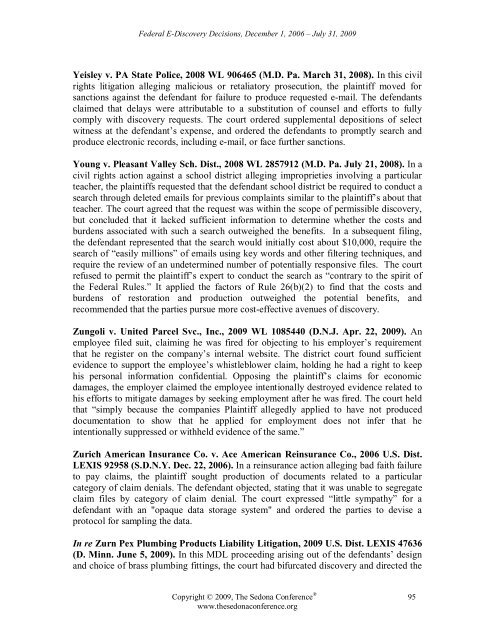Federal Court Decisions Involving Electronic Discovery, December 1 ...
Federal Court Decisions Involving Electronic Discovery, December 1 ...
Federal Court Decisions Involving Electronic Discovery, December 1 ...
You also want an ePaper? Increase the reach of your titles
YUMPU automatically turns print PDFs into web optimized ePapers that Google loves.
<strong>Federal</strong> E-<strong>Discovery</strong> <strong>Decisions</strong>, <strong>December</strong> 1, 2006 – July 31, 2009<br />
Yeisley v. PA State Police, 2008 WL 906465 (M.D. Pa. March 31, 2008). In this civil<br />
rights litigation alleging malicious or retaliatory prosecution, the plaintiff moved for<br />
sanctions against the defendant for failure to produce requested e-mail. The defendants<br />
claimed that delays were attributable to a substitution of counsel and efforts to fully<br />
comply with discovery requests. The court ordered supplemental depositions of select<br />
witness at the defendant’s expense, and ordered the defendants to promptly search and<br />
produce electronic records, including e-mail, or face further sanctions.<br />
Young v. Pleasant Valley Sch. Dist., 2008 WL 2857912 (M.D. Pa. July 21, 2008). In a<br />
civil rights action against a school district alleging improprieties involving a particular<br />
teacher, the plaintiffs requested that the defendant school district be required to conduct a<br />
search through deleted emails for previous complaints similar to the plaintiff’s about that<br />
teacher. The court agreed that the request was within the scope of permissible discovery,<br />
but concluded that it lacked sufficient information to determine whether the costs and<br />
burdens associated with such a search outweighed the benefits. In a subsequent filing,<br />
the defendant represented that the search would initially cost about $10,000, require the<br />
search of “easily millions” of emails using key words and other filtering techniques, and<br />
require the review of an undetermined number of potentially responsive files. The court<br />
refused to permit the plaintiff’s expert to conduct the search as “contrary to the spirit of<br />
the <strong>Federal</strong> Rules.” It applied the factors of Rule 26(b)(2) to find that the costs and<br />
burdens of restoration and production outweighed the potential benefits, and<br />
recommended that the parties pursue more cost-effective avenues of discovery.<br />
Zungoli v. United Parcel Svc., Inc., 2009 WL 1085440 (D.N.J. Apr. 22, 2009). An<br />
employee filed suit, claiming he was fired for objecting to his employer’s requirement<br />
that he register on the company’s internal website. The district court found sufficient<br />
evidence to support the employee’s whistleblower claim, holding he had a right to keep<br />
his personal information confidential. Opposing the plaintiff’s claims for economic<br />
damages, the employer claimed the employee intentionally destroyed evidence related to<br />
his efforts to mitigate damages by seeking employment after he was fired. The court held<br />
that “simply because the companies Plaintiff allegedly applied to have not produced<br />
documentation to show that he applied for employment does not infer that he<br />
intentionally suppressed or withheld evidence of the same.”<br />
Zurich American Insurance Co. v. Ace American Reinsurance Co., 2006 U.S. Dist.<br />
LEXIS 92958 (S.D.N.Y. Dec. 22, 2006). In a reinsurance action alleging bad faith failure<br />
to pay claims, the plaintiff sought production of documents related to a particular<br />
category of claim denials. The defendant objected, stating that it was unable to segregate<br />
claim files by category of claim denial. The court expressed “little sympathy” for a<br />
defendant with an "opaque data storage system" and ordered the parties to devise a<br />
protocol for sampling the data.<br />
In re Zurn Pex Plumbing Products Liability Litigation, 2009 U.S. Dist. LEXIS 47636<br />
(D. Minn. June 5, 2009). In this MDL proceeding arising out of the defendants’ design<br />
and choice of brass plumbing fittings, the court had bifurcated discovery and directed the<br />
Copyright © 2009, The Sedona Conference ® 95<br />
www.thesedonaconference.org
















